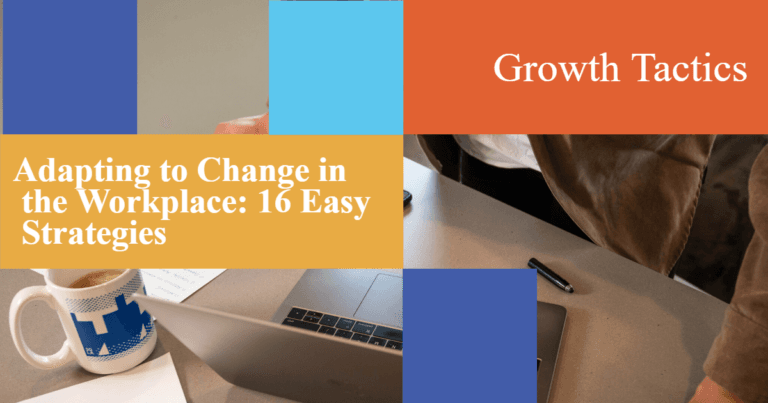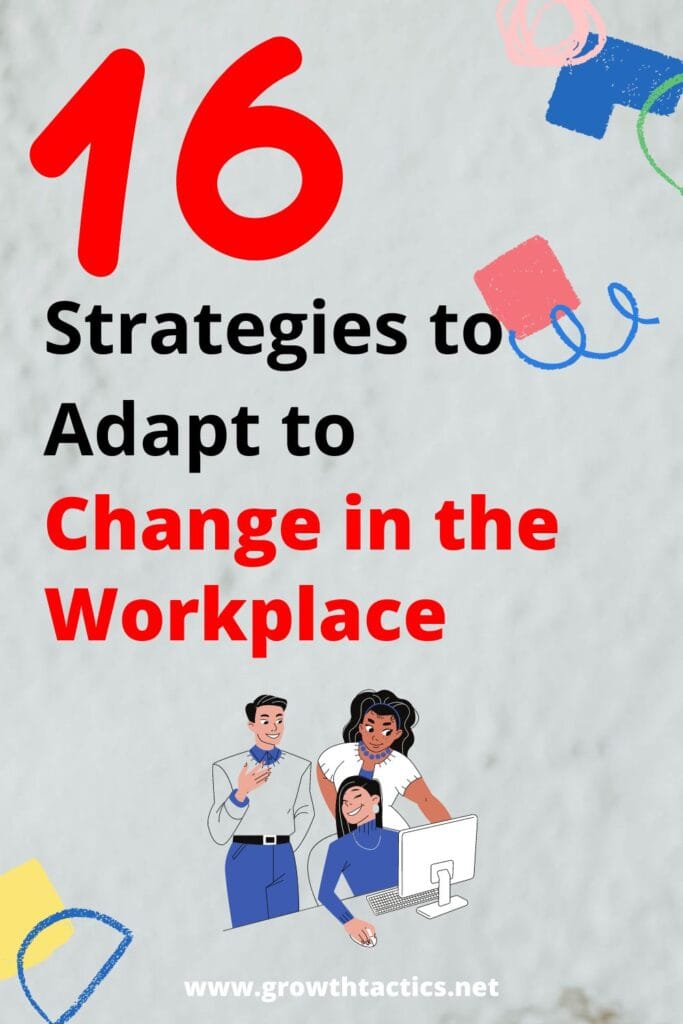In today’s fast-paced world, adaptability in the workplace is crucial. As technology advances, work environments change, and new challenges arise, the ability to adapt quickly can make all the difference.
Whether you’re navigating new workflows, embracing innovative tools, or adjusting to organizational shifts, being adaptable is now more important than ever. Learn how you can smoothly adapt to changes at work, enhance your productivity, and thrive amidst constant change.
Jump To Section
Understanding Adaptability
Let’s break down what adaptability really means in the workplace. In simple terms, adaptability is your ability to adjust to new conditions or changes. It’s about staying flexible and open to new ideas, even when things don’t go as planned.
What is Adaptability?
Adaptability is more than just going with the flow. It’s about actively engaging with change and finding ways to make it work for you. Think of it as your personal superpower to handle whatever comes your way. When you’re adaptable, you don’t just survive changes; you thrive in them.
Key Traits of Adaptable Employees
So, what does an adaptable employee look like? Here are a few key traits:
- Resilience: Bouncing back from setbacks quickly and not getting easily discouraged.
- Open-mindedness: Being willing to consider new ideas and different perspectives.
- Proactive Attitude: Taking charge of situations and finding solutions rather than waiting for things to happen.
- Problem-Solving Skills: Quickly identifying issues and coming up with effective solutions.
These traits help you smoothly navigate changes and even turn them into opportunities for growth.
Real-Life Examples
Imagine you’re used to a certain software for years, and suddenly, your company switches to a new one. If you’re adaptable, you won’t panic. Instead, you’ll take the time to learn the new software and figure out how it can make your job easier. This attitude not only helps you stay productive but also shows your team you’re a valuable asset.
When you understand adaptability and put it into practice, you set yourself up to succeed no matter what changes come your way.
Benefits of Adaptability
Adaptability isn’t just a fancy word you hear in job descriptions; it comes with a lot of real-life perks. Let’s explore the benefits of being adaptable in both your professional and personal life.
- Boosts Problem-Solving Skills: When you’re adaptable, you’re better at solving problems. You don’t get stuck because something unexpected happens. Instead, you quickly think on your feet and find solutions. This skill makes you a go-to person in tough situations.
- Enhances Career Growth: Being adaptable can open up new opportunities for you. Employers value employees who can handle changes without breaking a sweat. This trait can make you stand out when it comes time for promotions or new job offers. When you’re flexible and willing to learn, you show that you’re ready for bigger challenges.
- Improves Relationships: Whether it’s with coworkers or friends, adaptability helps you get along better with others. By being open-minded and willing to compromise, you build stronger relationships. People appreciate someone who can go with the flow and adjust when needed.
- Reduces Stress: Change can be stressful, but if you’re adaptable, you handle it better. Instead of feeling anxious about new situations, you see them as opportunities to grow. This positive mindset can significantly reduce your stress levels and make you happier overall.
- Encourages Continuous Learning: Adaptable people are always learning. They’re curious and eager to pick up new skills. This continuous learning helps you stay relevant in your field and keeps your job exciting. It also makes you more resilient to changes in the job market.
- Fosters Innovation: When you’re adaptable, you’re not afraid to try new things. This willingness to experiment leads to innovation. You come up with creative solutions and fresh ideas that benefit your team and company.
Adaptability offers numerous benefits that can improve various aspects of your life. From boosting your career to enhancing your personal relationships, being adaptable makes you more equipped to handle whatever comes your way. So, embrace change and let your adaptability shine.
Strategies for Adapting to Change
Adapting to change can be tough, but it doesn’t have to be overwhelming. With the right strategies, you can become more flexible and handle whatever life throws your way. Let’s dive into some easy, practical tips for embracing change.
Stay Open-Minded
One of the best ways to adapt to change is to keep an open mind. Don’t immediately reject new ideas or ways of doing things. Instead, take a moment to consider how they might benefit you. Being open-minded helps you see opportunities where others might see obstacles.
Keep Learning
Always be curious and eager to learn. Whether it’s a new software at work or a different culture while traveling, embrace the chance to gain new knowledge. The more you know, the easier it is to adapt to different situations.
Stay Positive
A positive attitude goes a long way when dealing with change. Instead of focusing on what you’re losing, think about what you can gain. Positive thinking helps you navigate changes with less stress and more enthusiasm.
Be Proactive
Take charge of the situation instead of waiting for things to happen. If you know a change is coming, prepare for it. Learn new skills, gather information, and plan ahead. Being proactive makes you feel more in control and less anxious.
Seek Support
You don’t have to go through changes alone. Talk to friends, family, or coworkers. Share your feelings and get their insights. Sometimes, just having someone listen can make a big difference. Plus, they might offer valuable advice that you hadn’t considered.
Practice Flexibility
Get into the habit of being flexible. Try new things regularly, even in small ways. Maybe take a different route to work or try a new hobby. The more you practice being flexible, the easier it becomes to adapt when bigger changes come your way.
Focus on What You Can Control
Change often brings uncertainty, but there are always elements you can control. Focus on those aspects rather than worrying about what you can’t change. This helps you stay grounded and more effective in handling the situation.
Embrace Change as a Learning Opportunity
Whenever change occurs, see it as a chance to learn something new. This approach not only helps you grow but also makes you more adaptable in the long run. The more you learn from each change, the better you get at handling future ones.
Stay Physically and Mentally Healthy
Good health is crucial when adapting to change. Exercise, eat well, and get enough sleep. Practice mindfulness or meditation to reduce stress. When you’re physically and mentally fit, you’re better prepared to handle change.
Develop Strong Organizational Skills
Being organized helps you manage change better. Keep a calendar, make to-do lists, and prioritize tasks. Good organizational skills can make transitions smoother and less chaotic.
Break Changes into Smaller Steps
Big changes can feel overwhelming. Break them down into smaller, manageable steps. Focus on completing one step at a time. This makes the change seem less daunting and more achievable.
Celebrate Small Wins
Acknowledge and celebrate small successes along the way. This boosts your confidence and motivation to tackle the next step. Positive reinforcement helps you adapt more readily to changes.
Stay Connected with Your Core Values
When change happens, stay true to your core values. Let these guide your decisions and actions. Having a solid foundation provides a sense of stability, even in times of change.
Seek Professional Help if Needed
Sometimes, change can be really tough to handle on your own. Don’t hesitate to seek professional help, like a counselor or coach. They can provide you with strategies and support to better manage the transition.
Practice Patience
Change often takes time. Be patient with yourself and others as you adjust. Rome wasn’t built in a day, and neither are new habits or routines.
Be Grateful
Practicing gratitude can help you focus on the positive aspects of change. Keep a gratitude journal and write down things you’re thankful for. This shifts your mindset from what you’re losing to what you’re gaining.
Adapting to change is a skill that can be developed with practice and the right mindset. By staying open-minded, continuing to learn, and focusing on what you can control, you’ll find it easier to handle whatever comes your way. Remember, embracing change can lead to new and exciting opportunities, so don’t be afraid to step out of your comfort zone.
Conclusion
Adapting to change in the workplace doesn’t have to be daunting. By taking small, manageable steps, you can become more flexible and ready to roll with whatever comes your way.
Start by keeping an open mind and staying positive. Embrace new opportunities to learn and grow. Don’t shy away from challenges; instead, see them as a chance to develop new skills. Remember, being proactive and organized helps you manage change more smoothly.
Talk to your colleagues and lean on your support network. You’re not alone in this journey. Share ideas, seek feedback, and learn from each other. Adapting to change is a team effort, and it’s okay to ask for help along the way.
Lastly, remember to celebrate your small wins and be patient with yourself. Change takes time, and every step forward, no matter how small, is progress.
So, let’s do this! Embrace the changes, stay adaptable, and keep pushing forward. You’ve got this, and your future self will thank you for taking these steps today. Happy adapting!


